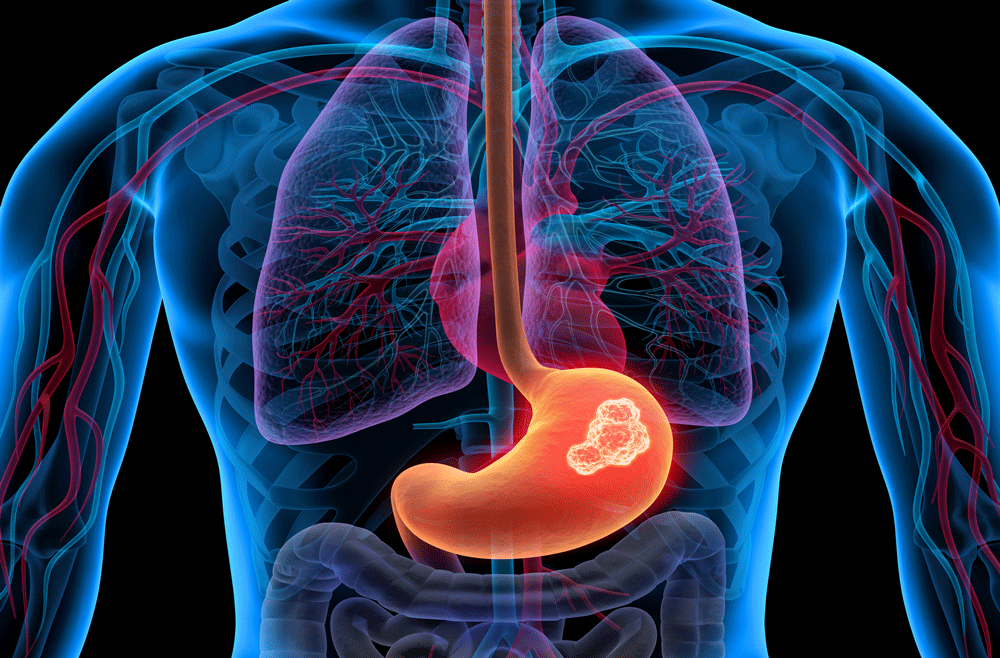Source: Thailand Medical News Jan 26, 2020 5 years, 2 months, 4 weeks, 2 days, 22 hours, 47 minutes ago
Over 1.3 million cases of
gastric cancer are diagnosed each year around the world.
Stomach or
gastric cancer is the 5th most commonly diagnosed
cancer in the world, and the 7th most prevalent. If healthcare providers detect the
stomach cancer in early stages when the
cancer is still only in the
stomach, the five-year survival rate is about 65%. If they find the
stomach cancer when it's spread to areas near the
stomach or to nearby lymph nodes, the five-year survival rate is about 30%.

Now, a novel drug, named “
FerriIridium”, can simultaneously help diagnose and treat
gastric cancer. The initially weakly active precursor (prodrug), based on an
iridium-containing compound, is selectively activated only after reaching the interior of a tumor cell. This is possible because of the higher amount of iron present there in cancer cells, report medical scientists in the journal Angewandte Chemie. Selective activation reduces undesired side effects according to the researchers.
Typically, cells transport substances from their exterior to their interior by folding in small regions of their membrane and then binding them off (endocytosis). This is how
FerriIridium enters target cells. The resulting vesicles then fuse with lysosomes. These cell organelles have an acidic environment that contains trivalent iron ions, Fe(III), and enzymes, with which they dismantle cell components that are no longer needed. In gastric cancer cells, the Fe(III) concentration within the lysosomes is significantly elevated.
Medical scientists working with Dr Yu Chen and Dr Hui Chao at Sun Yat-Sen University, Guangzhou, and Hunan University of Science and Technology, Xiangtan (China) made use of this feature. They equipped
FerriIridium with a special functional group (the m-iminocatechol group) that selectively binds to Fe(III). When bound, the functional group is oxidized while the iron ions are reduced to Fe(II). Under the acidic conditions within the lysosomes, the FerriIridium is then split into two components: an
iridium complex and a benzoquinone derivative.
The researchers told
Thailand Medical News that this reaction mechanism has a threefold effect. First, Fe(II) ions can catalyze a reaction that produces highly reactive hydroxyl radicals. Second, benzoquinones are highly oxidizing. With certain cellular substances, such as NADPH, they form hydroxyquinones, which react with oxygen to produce radical oxygen species, as well as hydrogen peroxide, which in turn can react with Fe(II) to produce hydroxyl radicals. Benzoquinone compounds can also disrupt cellular respiration. The radicals destroy the lysosomes, releasing their contents. Third, the splitting of
ng>FerriIridium drastically increases both the phosphorescence and the toxicity of the iridium complex. The phosphorescence can be used to diagnose the tumor.
Most significantly however, the toxic iridium complex is absorbed by mitochondria of the cancer cells, the “cellular power plants”. It destroys them from the inside out by collapsing their membrane potential. Together, these effects lead to the death of the gastric cancer cells and shrinking of the tumors, as demonstrated by experiments on cell lines and mice.
The researchers are already planning human clinical trials that will start in the first quarter of 2020.
Reference: Hui Chao, et al., FerriIridium: A Lysosome‐Targeting Iron(III)‐Activated Iridium(III) Prodrug for Chemotherapy in Gastric Cancer Cells. Angewandte Chemie International Edition, DOI: 10.1002/anie.201915828 